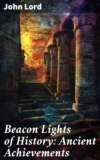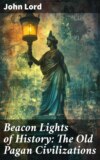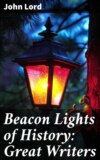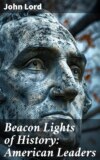Loe raamatut: «Beacon Lights of History, Volume 07: Great Women»
HÉLOÏSE
A.D. 1101-1164
LOVE
When Adam and Eve were expelled from Paradise, they yet found one flower, wherever they wandered, blooming in perpetual beauty. This flower represents a great certitude, without which few would be happy,–subtile, mysterious, inexplicable,–a great boon recognized alike by poets and moralists, Pagan and Christian; yea, identified not only with happiness, but human existence, and pertaining to the soul in its highest aspirations. Allied with the transient and the mortal, even with the weak and corrupt, it is yet immortal in its nature and lofty in its aims,–at once a passion, a sentiment, and an inspiration.
To attempt to describe woman without this element of our complex nature, which constitutes her peculiar fascination, is like trying to act the tragedy of Hamlet without Hamlet himself,–an absurdity; a picture without a central figure, a novel without a heroine, a religion without a sacrifice. My subject is not without its difficulties. The passion or sentiment I describe is degrading when perverted, as it is exalting when pure. Yet it is not vice I would paint, but virtue; not weakness, but strength; not the transient, but the permanent; not the mortal, but the immortal,–all that is ennobling in the aspiring soul.
"Socrates," says Legouvé, "who caught glimpses of everything that he did not clearly define, uttered one day to his disciples these beautiful words: 'There are two Venuses: one celestial, called Urania, the heavenly, who presides over all pure and spiritual affections; and the other Polyhymnia, the terrestrial, who excites sensual and gross desires.'" The history of love is the eternal struggle between these two divinities,–the one seeking to elevate and the other to degrade. Plato, for the first time, in his beautiful hymn to the Venus Urania, displayed to men the unknown image of love,–the educator and the moralist,–so that grateful ages have consecrated it by his name. Centuries rolled away, and among the descendants of Teutonic barbarians a still lovelier and more ideal sentiment burst out from the lips of the Christian Dante, kindled by the adoration of his departed Beatrice. And as she courses from star to star, explaining to him the mysteries, the transported poet exclaims:–
"Ah, all the tongues which the Muses have inspired could not tell the thousandth part of the beauty of the smile of Beatrice as she presented me to the celestial group, exclaiming, 'Thou art redeemed!' O woman, in whom lives all my hope, who hast deigned to leave for my salvation thy footsteps on the throne of the Eternal, thou hast redeemed me from slavery to liberty; now earth has no more dangers for me. I cherish the image of thy purity in my bosom, that in my last hour, acceptable in thine eyes, my soul may leave my body."
Thus did Dante impersonate the worship of Venus Urania,–spiritual tenderness overcoming sensual desire. Thus faithful to the traditions of this great poet did the austere Michael Angelo do reverence to the virtues of Vittoria Colonna. Thus did the lofty Corneille present in his Pauline a divine model of the love which inspires great deeds and accompanies great virtues. Thus did Shakspeare, in his portrait of Portia, show the blended generosity and simplicity of a woman's soul:–
"For you [my Lord Bassanio]
I would be trebled twenty times myself;
A thousand times more fair, ten thousand times more rich;"
or, in his still more beautiful delineation of Juliet, paint an absorbing devotion:–
"My bounty is as boundless as the sea,
My love as deep; the more I give to thee,
The more I have, for both are infinite."
Thus did Milton, in his transcendent epic, show how a Paradise was regained when woman gave her generous sympathy to man, and reproduced for all coming ages the image of Spiritual Love,–the inamorata of Dante and Petrarch, the inspired and consoling guide.
But the muse of the poets, even when sanctified by Christianity, never sang such an immortal love as the Middle Ages in sober prose have handed down in the history of Héloïse,–the struggle between the two Venuses of Socrates, and the final victory of Urania, though not till after the temporary triumph of Polyhymnia,–the inamorata of earth clad in the vestments of a sanctified recluse, and purified by the chastisements of Heaven. "Saint Theresa dies longing to join her divine spouse; but Saint Theresa is only a Héloïse looking towards heaven." Héloïse has an earthly idol; but her devotion has in it all the elements of a supernatural fervor,–the crucifixion of self in the glory of him she adored. He was not worthy of her idolatry; but she thought that he was. Admiration for genius exalted sentiment into adoration, and imagination invested the object of love with qualities superhuman.
Nations do not spontaneously keep alive the memory of those who have disgraced them. It is their heroes and heroines whose praises they sing,–those only who have shone in the radiance of genius and virtue. They forget defects, if these are counterbalanced by grand services or great deeds,–if their sons and daughters have shed lustre on the land which gave them birth. But no lustre survives egotism or vice; it only lasts when it gilds a noble life. There is no glory in the name of Jezebel, or Cleopatra, or Catherine de' Medici, brilliant and fascinating as were those queens; but there is glory in the memory of Héloïse. There is no woman in French history of whom the nation is prouder; revered, in spite of early follies, by the most austere and venerated saints of her beclouded age, and hallowed by the tributes of succeeding centuries for those sentiments which the fires of passion were scarcely able to tarnish, for an exalted soul which eclipsed the brightness of uncommon intellectual faculties, for a depth of sympathy and affection which have become embalmed in the heart of the world, and for a living piety which blazes all the more conspicuously from the sins which she expiated by such bitter combats. She was human in her impulses, but divine in her graces; one of those characters for whom we cannot help feeling the deepest sympathy and the profoundest admiration,–a character that has its contradictions, like that warrior-bard who was after God's own heart, in spite of his crimes, because his soul thirsted for the beatitudes of heaven, and was bound in loving loyalty to his Maker, against whom he occasionally sinned by force of mortal passions, but whom he never ignored or forgot, and against whom he never persistently rebelled.
As a semi-warlike but religious age produced a David, with his strikingly double nature perpetually at war with itself and looking for aid to God,–his "sun," his "shield," his hope, and joy,–so an equally unenlightened but devout age produced a Héloïse, the impersonation of sympathy, disinterestedness, suffering, forgiveness, and resignation. I have already described this dark, sad, turbulent, superstitious, ignorant period of strife and suffering, yet not without its poetic charms and religious aspirations; when the convent and the castle were its chief external features, and when a life of meditation was as marked as a life of bodily activity, as if old age and youth were battling for supremacy,–a very peculiar state of society, in which we see the loftiest speculations of the intellect and the highest triumphs of faith blended with puerile enterprises and misdirected physical forces.
In this semi-barbaric age Héloïse was born, about the year 1101. Nobody knew who was her father, although it was surmised that he belonged to the illustrious family of the Montmorencies, which traced an unbroken lineage to Pharimond, before the time of Clovis. She lived with her uncle Fulbert, an ignorant, worldly-wise old canon of the Cathedral Church of Notre Dame in Paris. He called her his niece; but whether niece, or daughter, or adopted child, was a mystery. She was of extraordinary beauty, though remarkable for expression rather than for regularity of feature. In intellect she was precocious and brilliant; but the qualities of a great soul shone above the radiance of her wit. She was bright, amiable, affectionate, and sympathetic,–the type of an interesting woman. The ecclesiastic was justly proud of her, and gave to her all the education the age afforded. Although not meaning to be a nun, she was educated in a neighboring convent,–for convents, even in those times, were female seminaries, containing many inmates who never intended to take the veil. But the convent then, as since, was a living grave to all who took its vows, and was hated by brilliant women who were not religious. The convent necessarily and logically, according to the theology of the Middle Ages, was a retreat from the world,–a cell of expiation; and yet it was the only place where a woman could be educated.
Héloïse, it would seem, made extraordinary attainments, and spoke Latin as well as her native tongue. She won universal admiration, and in due time, at the age of eighteen, returned to her uncle's house, on the banks of the Seine, on the island called the Cité, where the majestic cathedral and the castle of the king towered above the rude houses of the people. Adjoining the church were the cloisters of the monks and the Episcopal School, the infant university of Paris, over which the Archdeacon of Paris, William of Champeaux, presided in scholastic dignity and pride,–next to the bishop the most influential man in Paris. The teachers of this school, or masters and doctors as they were called, and the priests of the cathedral formed the intellectual aristocracy of the city, and they were frequent visitors at the house of Fulbert the canon. His niece, as she was presumed to be, was the great object of attraction. There never was a time when intellectual Frenchmen have not bowed down to cultivated women. Héloïse, though only a girl, was a queen of such society as existed in the city, albeit more admired by men than women,–poetical, imaginative, witty, ready, frank, with a singular appreciation of intellectual excellence, dazzled by literary fame, and looking up to those brilliant men who worshipped her.
In truth, Héloïse was a prodigy. She was vastly superior to the men who surrounded her, most of whom were pedants, or sophists, or bigots; dignitaries indeed, but men who exalted the accidental and the external over the real and the permanent; men who were fond of quibbles and sophistries, jealous of each other and of their own reputation, dogmatic and positive as priests are apt to be, and most positive on points which either are of no consequence or cannot be solved. The soul of Héloïse panted for a greater intellectual freedom and a deeper sympathy than these priests could give. She pined in society. She was isolated by her own superiority,–superior not merely in the radiance of the soul, but in the treasures of the mind. Nor could her companions comprehend her greatness, even while they were fascinated by her presence. She dazzled them by her personal beauty perhaps more than by her wit; for even mediaeval priests could admire an expansive brow, a deep blue eye, doux et penétrant, a mouth varying with unconscious sarcasms, teeth strong and regular, a neck long and flexible, and shoulders sloping and gracefully moulded, over which fell ample and golden locks; while the attitude, the complexion, the blush, the thrilling accent, and the gracious smile, languor, and passion depicted on a face both pale and animated, seduced the imagination and commanded homage. Venus Polyhymnia stood confessed in all her charms, for the time triumphant over that Venus Urania who made the convent of the Paraclete in after times a blessed comforter to all who sought its consolations.
Among the distinguished visitors at the house of her uncle the canon, attracted by her beauty and accomplishments, was a man thirty-eight years of age, of noble birth, but by profession an ecclesiastic; whose large forehead, fiery eye, proud air, plain, negligent dress, and aristocratic manners, by turns affable and haughty, stamped him as an extraordinary man. The people in the streets stopped to gaze at him as he passed, or rushed to the doors and windows for a glimpse; for he was as famous for genius and learning as he was distinguished by manners and aspect. He was the eldest son of a Breton nobleman, who had abandoned his inheritance and birthright for the fascinations of literature and philosophy. His name was Peter Abélard, on the whole the most brilliant and interesting man whom the Middle Ages produced,–not so profound as Anselm, or learned as Peter Lombard, or logical as Thomas Aquinas, or acute as Albertus Magnus, but the most eloquent expounder of philosophy of whom I have read. He made the dullest subjects interesting; he clothed the dry bones of metaphysics with flesh and blood; he invested the most abstruse speculations with life and charm; he filled the minds of old men with envy, and of young men with admiration; he thrilled admirers with his wit, sarcasm, and ridicule,–a sort of Galileo, mocking yet amusing, with a superlative contempt of dulness and pretension. He early devoted himself to dialectics, to all the arts of intellectual gladiatorship, to all the sports of logical tournaments which were held in such value by the awakened spirits of the new civilization.
Such was Abélard's precocious ability, even as a youth, that no champion could be found to refute him in the whole of Brittany. He went from castle to castle, and convent to convent, a philosophical knight-errant, seeking intellectual adventures; more intent, however, on éclat and conquest than on the establishment of the dogmas which had ruled the Church since Saint Augustine. He was a born logician, as Bossuet was a born priest, loving to dispute as much as the Bishop of Meaux loved to preach; not a serious man, but a bright man, ready, keen, acute, turning fools into ridicule, and pushing acknowledged doctrines into absurdity; not to bring out the truth as Socrates did, or furnish a sure foundation of knowledge, but to revolutionize and overturn. His spirit was like that of Lucien,–desiring to demolish, without substituting anything for the dogmas he had made ridiculous. Consequently he was mistrusted by the old oracles of the schools, and detested by conservative churchmen who had intellect enough to see the tendency of his speculations. In proportion to the hatred of orthodox ecclesiastics like Anselme of Laon and Saint Bernard, was the admiration of young men and of the infant universities. Nothing embarrassed him. He sought a reason for all things. He appealed to reason rather than authority, yet made the common mistake of the scholastics in supposing that metaphysics could explain everything. He doubtless kindled a spirit of inquiry, while he sapped the foundation of Christianity and undermined faith. He was a nominalist; that is, he denied the existence of all eternal ideas, such as Plato and the early Fathers advocated. He is said to have even adduced the opinions of Pagan philosophers to prove the mysteries of revelation. He did not deny revelation, nor authority, nor the prevailing doctrines which the Church indorsed and defended; but the tendency of his teachings was to undermine what had previously been received by faith. He exalted reason, therefore, as higher than faith. His spirit was offensive to conservative teachers. Had he lived in our times, he would have belonged to the most progressive schools of thought and inquiry,–probably a rationalist, denying what he could not prove by reason, and scorning all supernaturalism; a philosopher of the school of Hume, or Strauss, or Renan. And yet, after assailing everything venerable, and turning his old teachers into ridicule, and creating a spirit of rationalistic inquiry among the young students of divinity, who adored him, Abélard settled back on authority in his old age, perhaps alarmed and shocked at the mischief he had done in his more brilliant years.
This exceedingly interesting man, with all his vanity, conceit, and arrogance, had turned his steps to Paris, the centre of all intellectual life in France, after he had achieved a great provincial reputation. He was then only twenty, a bright and daring youth, conscious of his powers, and burning with ambition. He was not ambitious of ecclesiastical preferment, for aristocratic dunces occupied the great sees and ruled the great monasteries. He was simply ambitious of influence over students in philosophy and religion,–fond of éclat and fame as a teacher. The universities were not then established; there were no chairs for professors, nor even were there scholastic titles, like those of doctor and master; but Paris was full of students, disgusted with the provincial schools. The Cathedral School of Paris was the great attraction to these young men, then presided over by William of Champeaux, a very respectable theologian, but not a remarkable genius like Aquinas and Bonaventura, who did not arise until the Dominican and Franciscan orders were established to combat heresy. Abélard, being still a youth, attended the lectures of this old theologian, who was a Realist, not an original thinker, but enjoying a great reputation, which he was most anxious to preserve. The youthful prodigy at first was greatly admired by the veteran teacher; but Abélard soon began to question him and argue with him. Admiration was then succeeded by jealousy. Some sided with the venerable teacher, but more with the flippant yet brilliant youth who turned his master's teachings into ridicule, and aspired to be a teacher himself. But as teaching was under the supervision of the school of Notre Dame, Paris was interdicted to him; he was not allowed to combat the received doctrines which were taught in the Cathedral School. So he retired to Melun, about thirty miles from Paris, and set up for a teacher and lecturer on philosophy. All the influence of William of Champeaux and his friends was exerted to prevent Abélard from teaching, but in vain. His lecture-room was crowded. The most astonishing success attended his lectures. Not contented with the éclat he received, he now meditated the discomfiture of his old master. He removed still nearer to Paris. And so great was his success and fame, that it is said he compelled William to renounce his Realism and also his chair, and accept a distant bishopric. William was conquered by a mere stripling; but that stripling could have overthrown a Goliath of controversy, not with a sling, but with a giant's sword.
Abélard having won a great dialectical victory, which brought as much fame as military laurels on the battlefield, established himself at St. Geneviève, just outside the walls of Paris, where the Pantheon now stands, which is still the centre of the Latin quarter, and the residence of students. He now applied himself to the study of divinity, and attended the lectures of Anselm of Laon. This celebrated ecclesiastic, though not so famous or able as Anselm of Canterbury, was treated by Abélard with the same arrogance and flippancy as he had bestowed on William of Champeaux. "I frequented," said the young mocker, "the old man's school, but soon discovered that all his power was in length of practice. You would have thought he was kindling a fire, when instantly the whole house was filled with smoke, in which not a single spark was visible. He was a tree covered with thick foliage, which to the distant eye had charms, but on near inspection there was no fruit to be found; a fig-tree such as our Lord did curse; an oak such as Lucan compared Pompey to,–Stat magni nominis umbra."
What a comment on the very philosophy which Abélard himself taught! What better description of the scholasticism of the Middle Ages! But original and brilliant as was the genius of Abélard, he no more could have anticipated the new method which Bacon taught than could Thomas Aquinas. All the various schools of the mediaeval dialecticians, Realists and Nominalists alike, sought to establish old theories, not to discover new truth. They could not go beyond their assumptions. So far as their assumptions were true, they rendered great service by their inexorable logic in defending them. They did not establish premises; that was not their concern or mission. Assuming that the sun revolved around the earth, all their astronomical speculations were worthless, even as the assumption of the old doctrine of atoms in our times has led scientists to the wildest conclusions. The metaphysics of the Schoolmen, whether they were sceptical or reverential, simply sharpened the intellectual faculties without advancing knowledge.
Abélard belonged by nature to the sceptical school. He delighted in negations, and in the work of demolition. So far as he demolished or ridiculed error he rendered the same service as Voltaire did: he prepared the way for a more inquiring spirit. He was also more liberal than his opponents. His spirit was progressive, but his method was faulty. Like all those who have sought to undermine the old systems of thought, he was naturally vain and conceited. He supposed he had accomplished more than he really had. He became bold in his speculations, and undertook to explain subjects beyond his grasp. Thus he professed to unfold the meaning of the prophecies of Ezekiel. He was arrogant in his claims to genius. "It is not by long study," said he, "that I have mastered the heights of science, but by the force of my mind." This flippancy, accompanied by wit and eloquence, fascinated young men. His auditors were charmed. "The first philosopher," they said, "had become the first divine." New pupils crowded his lecture-room, and he united lectures on philosophy with lectures on divinity. "Theology and philosophy encircled his brow with a double garland." So popular was he, that students came from Germany and Italy and England to hear his lectures. The number of his pupils, it is said, was more than five thousand; and these included the brightest intellects of the age, among whom one was destined to be a pope (the great Innocent III.), nineteen to be cardinals, and one hundred to be bishops. What a proud position for a young man! What an astonishing success for that age! And his pupils were as generous as they were enthusiastic. They filled his pockets with gold; they hung upon his lips with rapture; they extolled his genius wherever they went; they carried his picture from court to court, from castle to castle, and convent to convent; they begged for a lock of his hair, for a shred of his garment. Never was seen before such idolatry of genius, such unbounded admiration for eloquence; for he stood apart and different from all other lights,–pre-eminent as a teacher of philosophy. "He reigned," says Lamartine, "by eloquence over the spirit of youth, by beauty over the regard of women, by love-songs which penetrated all hearts, by musical melodies repeated by every mouth. Let us imagine in a single man the first orator, the first philosopher, the first poet, the first musician of the age,–Cicero, Plato, Petrarch, Schubert,–all united in one living celebrity, and we can form some idea of his attractions and fame at this period of his life."
Such was that brilliant but unsound man, with learning, fame, personal beauty, fascinating eloquence, dialectical acumen, aristocratic manners, and transcendent wit, who encountered at thirty-eight the most beautiful, gracious, accomplished, generous, and ardent woman that adorned that time,–only eighteen, thirsting for knowledge, craving for sympathy, and intensely idolatrous of intellectual excellence. But one result could be anticipated from such a meeting: they became passionately enamored of each other. In order to secure a more uninterrupted intercourse, Abélard sought and obtained a residence in the house of Fulbert, under pretence of desiring to superintend the education of his niece. The ambitious, vain, unsuspecting priest was delighted to receive so great a man, whose fame filled the world. He intrusted Héloïse to his care, with permission to use blows if they were necessary to make her diligent and obedient!
And what young woman with such a nature and under such circumstances could resist the influence of such a teacher? I need not dwell on the familiar story, how mutual admiration was followed by mutual friendship, and friendship was succeeded by mutual infatuation, and the gradual abandonment of both to a mad passion, forgetful alike of fame and duty.
"It became tedious," said Abélard, "to go to my lessons. I gave my lectures with negligence. I spoke only from habit and memory. I was only a reciter of ancient inventions; and if I chanced to compose verses, they were songs of love, not secrets of philosophy." The absence of his mind evinced how powerfully his new passion moved his fiery and impatient soul. "He consumed his time in writing verses to the canon's niece; and even as Hercules in the gay court of Omphale threw down his club in order to hold the distaff, so Abélard laid aside his sceptre as a monarch of the schools to sing sonnets at the feet of Héloïse." And she also, still more unwisely, in the mighty potency of an absorbing love, yielded up her honor and her pride. This mutual infatuation was, it would seem, a gradual transition from the innocent pleasure of delightful companionship to the guilt of unrestrained desire. It was not premeditated design,–not calculation, but insidious dalliance:–
"Thou know'st how guiltless first I met thy flame,
When love approached me under friendship's name.
Guiltless I gazed; heaven listened when you sung,
And truths divine came mended from your tongue.
From lips like those, what precept failed to move?
Too soon they taught me 't was no sin to love."
In a healthy state of society this mutual passion would have been followed by the marriage ties. The parties were equal in culture and social position. And Abélard probably enjoyed a large income from the fees of students, and could well support the expenses of a family. All that was needed was the consecration of emotions, which are natural and irresistible,–a mystery perhaps but ordained, and without which marriage would be mere calculation and negotiation. Passion, doubtless, is blind; but in this very blindness we see the hand of the Creator,–to baffle selfishness and pride. What would become of our world if men and women were left to choose their partners with the eye of unclouded reason? Expediency would soon make a desert of earth, and there would be no paradise found for those who are unattractive or in adverse circumstances. Friendship might possibly bring people together; but friendship exists only between equals and people of congenial tastes. Love brings together also those who are unequal. It joins the rich to the poor, the strong to the weak, the fortunate to the unfortunate, and thus defeats the calculations which otherwise would enter into matrimonial life. Without the blindness of passionate love the darts of Cupid would be sent in vain; and the helpless and neglected–as so many are–would stand but little chance for that happiness which is associated with the institution of marriage. The world would be filled with old bachelors and old maids, and population would hopelessly decline among virtuous people.
No scandal would have resulted from the ardent loves of Abélard and Héloïse had they been united by that sacred relation which was ordained in the garden of Eden. "If any woman," says Legouvé, "may stand as the model of a wife in all her glory, it is Héloïse. Passion without bounds and without alloy, enthusiasm for the genius of Abélard, jealous care for his reputation, a vigorous intellect, learning sufficient to join in his labors, and an unsullied name."
But those false, sophistical ideas which early entered into monastic life, and which perverted the Christianity of the Middle Ages, presented a powerful barrier against the instincts of nature and the ordinances of God. Celibacy was accounted as a supernal virtue, and the marriage of a priest was deemed a lasting disgrace. It obscured his fame, his prospects, his position, and his influence; it consigned him to ridicule and reproach. He was supposed to be married only to the Church, and would be unfaithful to Heaven if he bound himself by connubial ties. Says Saint Jerome, "Take axe in hand and hew up by the roots the sterile tree of marriage. God permits it, I grant; but Christ and Mary consecrated virginity." Alas, what could be hoped when the Church endorsed such absurd doctrines! Hildebrand, when he denounced the marriage of priests, made war on the most sacred instincts of human nature. He may have strengthened the papal domination, but he weakened the restraints of home. Only a dark and beclouded age could have upheld such a policy. Upon the Church of the Middle Ages we lay the blame of these false ideas. She is in a measure responsible for the follies of Abélard and Héloïse. They were not greater than the ideas of their age. Had Abélard been as bold in denouncing the stupid custom of the Church in this respect as he was in fighting the monks of St. Denis or the intellectual intolerance of Bernard, he would not have fallen in the respect of good people. But he was a slave to interest and conventionality. He could not brave the sneers of priests or the opinions of society; he dared not lose caste with those who ruled the Church; he would not give up his chances of preferment. He was unwilling either to renounce his love, or to avow it by an honorable, open union.
At last his intimacy created scandal. In the eyes of the schools and of the Church he had sacrificed philosophy and fame to a second Delilah. And Héloïse was even more affected by his humiliation than himself. She more than he was opposed to marriage, knowing that this would doom him to neglect and reproach. Abélard would perhaps have consented to an open marriage had Héloïse been willing; but with a strange perversity she refused. His reputation and interests were dearer to her than was her own fair name. She sacrificed herself to his fame; she blinded herself to the greatest mistake a woman could make. The excess of her love made her insensible to the principles of an immutable morality. Circumstances palliated her course, but did not excuse it. The fatal consequences of her folly pursued her into the immensity of subsequent grief; and though afterwards she was assured of peace and forgiveness in the depths of her repentance, the demon of infatuated love was not easily exorcised. She may have been unconscious of degradation in the boundless spirit of self-sacrifice which she was willing to make for the object of her devotion, but she lost both dignity and fame. She entreated him who was now quoted as a reproach to human weakness, since the languor of passion had weakened his power and his eloquence, to sacrifice her to his fame; "to permit her no longer to adore him as a divinity who accepts the homage of his worshippers; to love her no longer, if this love diminished his reputation; to reduce her even, if necessary, to the condition of a woman despised by the world, since the glory of his love would more than compensate for the contempt of the universe."




















